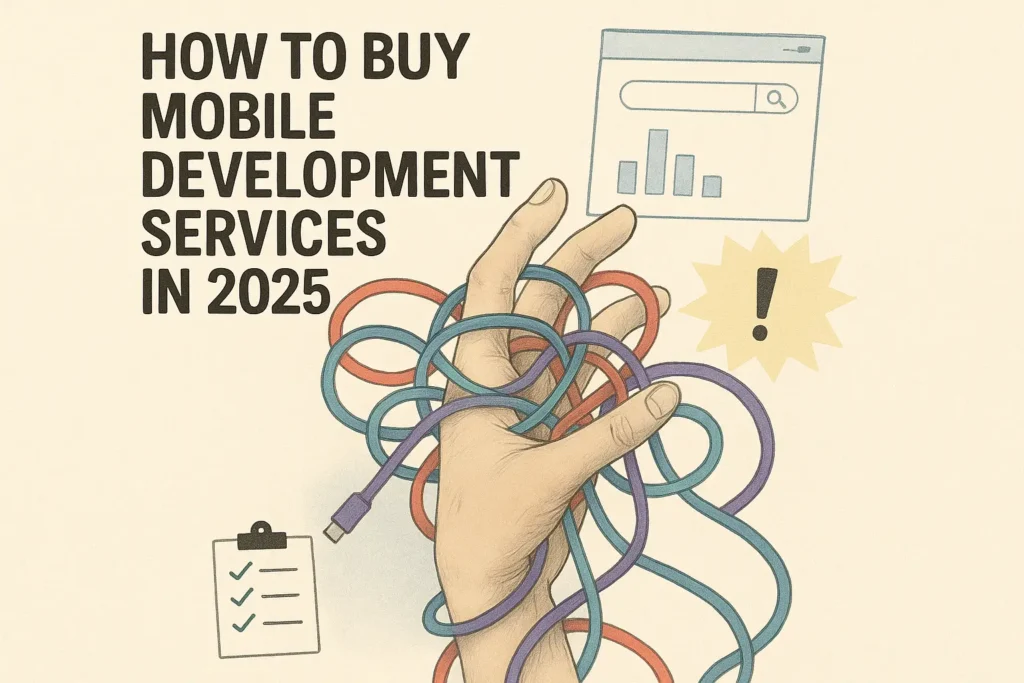5 key things you should know when starting your development journey
So, you need mobile development. Or maybe just considering your first steps to – how everyone calls it – digitalisation. Maybe it’s your very first time planning to build an app for your business. Maybe it’s your fifth – and the last few ones were an utter nightmare. You are smarter now. Wiser. And probably a little more skeptical.
Good news: welcome to 2025 – mobile apps are everywhere. Bad news: there are software development companies on almost every corner, and making the right decision feels like shopping for a new brain – confusing and full of buzzwords. And confusing all over again.
Let’s try to make it a bit easier. Here are some insights from Lerpal’s two decades of experience: what to know before you spend a cent.
1. Don’t buy code. Buy outcomes.
You’re not buying Swift or Kotlin. You’re buying user growth, retention, conversion, or operational efficiency. The right partner knows this – and talks to you like a businessman as well, not just as an engineer.
You can ask: “What factors will affect my project success?” or “Will this solve my headaches around the lost time, inconsistent service, or outdated internal process – you name it, go away?”
If they blink when hearing these, run.
Insights from our experts:
“Not every product needs to be launched in three weeks – but every product needs a solid plan. We’ll help you figure out when it’s worth moving fast, and when it’s smarter to slow down and get the basics right”.
“A great launch is just the beginning. Once real users show up, your app evolves: small tweaks, UX adjustments, optimisations. This feedback loop is where the product really takes shape. We bake in analytics from day one: A/B tests, crash analytics, subscription tracking – all built around tools like Firebase, Amplitude, Braze, Adapty and RevenueCat”.
2. Choose challengers, not cheerleaders
A great tech partner won’t just nod to everything you say. Not because they doubt your vision, but because they are committed to building something that works. They’ll ask tough questions. Flag risks early. Offer alternatives you hadn’t even considered.
In 2025, a thoughtful pushback isn’t a red flag – it is a sign your potential partner is focused on building the right thing, not just anything.
Look for a team that cares enough to disagree with you. The ones who want your product to succeed even if it means slowing down a notch. They’ll save you from
building a feature that will work incoherently, targeting users that are not your audience, or launching with the tech stack you can’t take over and support long term.
A great mobile development isn’t always about agreeing and sticking to the initial ideas. It’s about alignment. Look for the team that’s comfortable saying “there is a better way”.
3. Speed is good. Speed and stability is better
Everyone loves «MVPs in 3 weeks». It sounds great, and sometimes, a fast time-to-market really is the right move.
Other times, shipping too fast means cutting corners you’ll pay for later.
What matters most? Finding the balance. Some products need lightning-fast time to market to test a hypothesis. Others need more time to get it right.
Either way, what happens after launch matters just as much. New products should always be “covered” with proper analytics: A/B testing, crash reporting, performance monitoring, user insights.
Ask how the team manages QA, testing, DevOps, and release cycles. Are updates seamless? Is there a rollback plan? Do they monitor performance post-launch?
In 2025, true velocity means building not only fast, but building in the right way.
Insights from our experts:
“A solid team beats a dozen freelancers. Designer, developer, QA engineer, project manager, business analyst – when it’s all aligned, the result feels smoother for everyone, including your users”.
4. Own what you build
Your app isn’t just a product – it’s an asset. And like any asset, ownership matters. Code is close to useless if it’s not easily maintainable. You always have a right to clarify whatever you see as important. For example:
- Who controls the codebase?
- Is the documentation thorough and usable?
- Can my internal team easily take over if needed?
A solid development process is portable and doesn’t trap you. The best teams build with transparency, solid handover, and ownership in mind.
5. Look for clarity
Awards and big logos have their place (and yes, we have a few too) – but what really rematters is whether a team understands your context and can deliver within it.
Here’s what to pay attention to:
- Do their case studies reflect problems like yours?
- Do they explain how they work, not just what they built?
- Can they clearly walk you through the collaboration process before you sign?
Great mobile development starts with alignment, and that shows up in how clearly a team communicates before a single line of code is written.
If you’ll ask us what great mobile dev feels like, we’d say something like this:
It feels like clarity.
Like real progress.
Like there are people who have your back.
Feels like knowing what to expect ahead.
At Lerpal, we’ve been building mobile products since mobile became a thing. We know when to push back, when and how to accelerate – and when to stop you from making expensive mistakes.
Let’s talk about your experience so far and see how we can match what you’re looking for.







